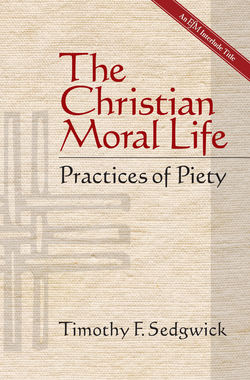Читать книгу The Christian Moral Life - Timothy F. Sedgwick - Страница 6
На сайте Литреса книга снята с продажи.
Preface to the 2008 Edition
ОглавлениеThe Christian moral life seeks to offer an account of the Christian life. It is in this sense that the word “piety” is used. Practices of piety refer not narrowly to spiritual practices but—as the word “piety” originally meant—to our duties that bind us to God, to our neighbors, and to our true selves. Christian ethics as reflection on the Christian life are not then narrow and separate disciplines concerned with right action (whether in terms of ends, virtues, or principles), but are grounded in our encounter with God and the practices that witness, nurture, and shape our continuing relationship with God. In this sense, The Christian Moral Life is formed in conversation with theology and with what has been traditionally called ascetical theology and what is now referred to more frequently as Christian spirituality or Christian practices—hence the subtitle, Practices of Piety.
In the Roman Catholic tradition moral theologies came to be more narrowly focused on offering direction to confessors in order that they might help penitents in the confession of sins and offer appropriate judgment and counsel. However, moral theologies from Thomas Aquinas to Barnard Haring have sought more comprehensively to ground moral principles and specific moral judgments in understandings of the end of human life in God, the nature of the human person, and human virtues grounded in relationship to God, all placed in the context of the sacramental, worshipping community of faith.
In this sense The Christian Moral Life seeks to offer a moral theology, grounded, however, in a renewed sense of the worshipping community. The understanding of the worshipping community in relationship to the world can no longer be taken-for-granted, as it was in the writing of traditional moral theologies when Christianity was established, what we call Christendom. Instead, the community of worship offers an alternative world, a sign of who we are meant to be, revealed in Scripture and known in the life of the community of faith as marked by its worship. So Edward Schillebeeckx’s sacramental principle: as Christ is the sacrament of God to the world, the church is the sacrament of Christ.1
The traditional elements of moral theology are then addressed in The Christian Moral Life within this larger context. There is an account of cardinal and theological virtues. These are grounded in an account of the encounter with God as a matter of hospitality to the stranger. Moral principles are developed as expressing the ends of action. And traditional questions are addressed, for example, the relationship between the love of God and neighbor, the first and the second table of the Ten Commandments, law and gospel, and love and justice. And this leads to the practices of piety, the nature of vocation, and the mission of God.
As I look back to my initial explorations of these matters in Sacramental Ethics: Paschal Identity and the Christian Life (Fortress, 1987) and ahead to Preaching What We Practice: Proclamation and Moral Discernment (Morehouse, 2007), with David Schlafer, I see how much my own work has explored what has been central to the great Anglican moral theologian Kenneth Kirk, from Some Principles of Moral Theology (Longmans, Green, 1920) and Conscience and Its Problems: An Introduction to Casuistry (Longmans, Green, 1927) to The Vision of God (Longmans, Green, 1928). The difference has been in casting the character of a Christian ethic in a post-Christendom world grounded in liturgical and sacramental theology. Here again, in Anglicanism this grounding in the worshipping community is prefaced by the first book to introduce the liturgical renewal movement in the English world, A.G. Hebert’s Liturgy and Society (Faber and Faber, 1935). The Christian Moral Life has this twentieth-century lineage. I hope that it may prompt its continued engagement and development.
__________
1 Edward Schillebeeckx, Christ: The Sacrament of the Encounter with God, tr. Paul Barrett (New York: Sheed and Ward, 1963).
